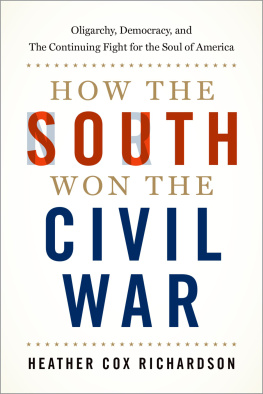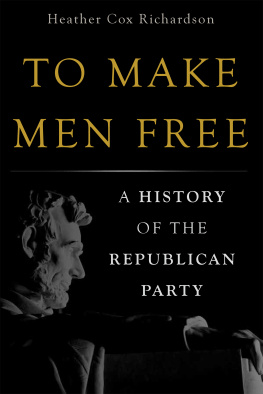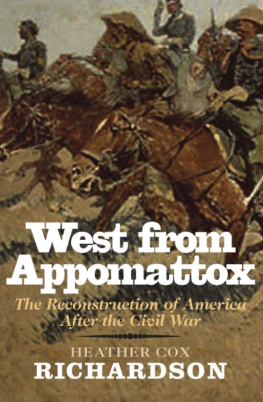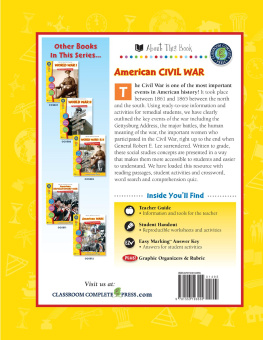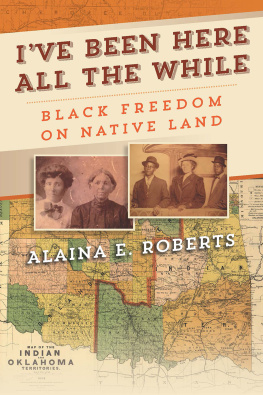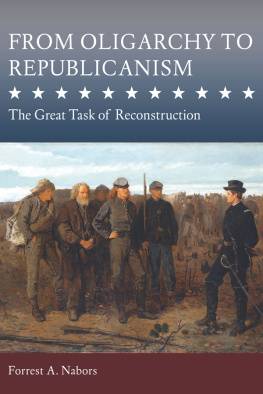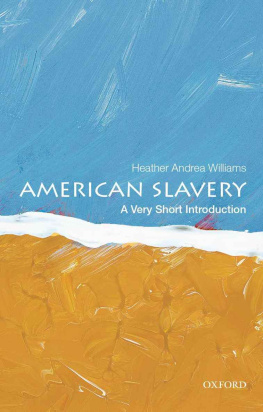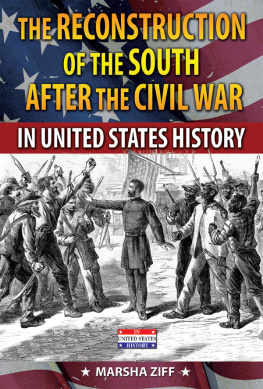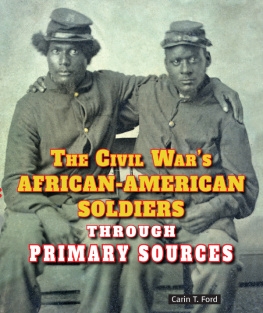HOW THE SOUTH WON
THE CIVIL WAR

Oxford University Press is a department of the University of Oxford. It furthers the Universitys objective of excellence in research, scholarship, and education by publishing worldwide. Oxford is a registered trade mark of Oxford University Press in the UK and certain other countries.
Published in the United States of America by Oxford University Press
198 Madison Avenue, New York, NY 10016, United States of America.
Heather Cox Richardson 2020
All rights reserved. No part of this publication may be reproduced, stored in a retrieval system, or transmitted, in any form or by any means, without the prior permission in writing of Oxford University Press, or as expressly permitted by law, by license, or under terms agreed with the appropriate reproduction rights organization. Inquiries concerning reproduction outside the scope of the above should be sent to the Rights Department, Oxford University Press, at the address above.
You must not circulate this work in any other form and you must impose this same condition on any acquirer.
Library of Congress Cataloging-in-Publication Data
Names: Richardson, Heather Cox, author.
Title: How the South won the Civil War : oligarchy, democracy, and the
continuing fight for the soul of America / Heather Cox Richardson.
Description: New York, NY : Oxford University Press, [2020] |
Includes bibliographical references and index. |
Identifiers: LCCN 2019036155 (print) | LCCN 2019036156 (ebook) |
ISBN 9780190900908 (hardcover) | ISBN 9780190900922 (epub) |
ISBN 9780190900915
Subjects: LCSH: Political cultureWest (U.S.)History. |
Political cultureSouthern StatesHistory. | OligarchyUnited States
History. | ConservatismUnited StatesHistory. | Equality
United StatesHistory. | United StatesTerritorial expansion
Political aspects. | United StatesHistoryCivil War, 18611865
Influence. | United StatesPolitics and government.
Classification: LCC JK1717.R54 2020 (print) | LCC JK1717 (ebook) |
DDC 306.20973dc23
LC record available at https://lccn.loc.gov/2019036155
LC ebook record available at https://lccn.loc.gov/2019036156
1 3 5 7 9 8 6 4 2
Printed by Sheridan Books, Inc., United States of America
For Buddy Poland
CONTENTS
Every book is a team effort, but this one, which took shape only after four years of grappling with theories of language and power as well as with the research of terrific scholars, required great indulgence from colleagues, friends, and family.
The project was sparked when Richard Young invited me to give a two-day talk on race in the West almost a decade ago. The theme percolated, and two years later I called him to see if my changing ideas were worth pursuing. After asking a lot of very smart questions, he said yes. Those initial thoughts drew strength from Mary Bilder, Jim Cronin, Dennis Dickerson, Kevin Kenny, Jim OToole, Alan Rogers, David Shi, Joel Wolfe, and Howard Bloom, who all urged me to throw ideas at the wall and see what stuck. Marquette University let me try out my ideas about power and language; the attendees at the 2016 conference of The Center for Civil War Research at the University of Mississippi conference greeted an early version of this book with enough enthusiasm that I was encouraged to continue. Graduate students Colin Notis-McConarty, Michael McLean, Katherine Carper, Elizabeth Pingree, Mia Michael, Heather Shar, and Laurel Teal read, listened, and argued. Literary agent Lisa Adamss steady conviction that there was an important story emerging from my early musings saw the project through to a proposal.
Once there was a proposal there had to be words on a page. Todd Arrington and Kevin Gannon kept me focused with writing sprints, and my #BookSquad colleaguesLiz Covart, Sara Georgini, Kevin Levin, Seth Jacobs, Megan Kate Nelson, and Nina Silberprovided criticism, encouragement, and mint chip ice cream. Jason Herbert, Peter Josephson, T. J. Stiles, Josh Rothman, Kathryn Cundiff, and Amanda Shaver let me bounce ideas off them, and persuaded me to make some hard decisions about what to include and what to leave out.
Once there were words on the page there had to be readers and critics. Eric Arnesen, Michael Bazemore, Lora Dawn Burnett, Philip Cardella, Michael Miles, and Virginia Scharff were all generous with their time and comments.
And finally, once there was a book there had to be editors. Timothy Bent, Melissa Yanuzzi, Susan Warga, and Mary Anne Shahidi shaped this project and saw it through to completion.
Colleagues become friends over projects like this, and friends become vital to the intellectual work of the project. Nancy Evans and Leonie Glen shared their observations about power and language in the ancient world on walks and over dinner. Carol Nowacki and I hashed out power and politics, while Kristina Dahl read an early version of this manuscript and took me to task for underplaying gender. Lynn Lyerly and Eric Rauchway argued and prodded, and kept an eye out for my health and happiness, too, which was much appreciated.
I owe a profound debt to Michael S. Green, who has been reader, researcher, critic, advisor, and cheerleader to this book, as well as a dear friend to its author. Because the subject matter is in his wheelhouse, he was the first person I called with these ideas, and his faith in the projectand in mehas been unstinting. I am most grateful.
I could not do what I do without the cheerful indulgence of my kidsRob, Marshall, and Eva Pontrelliand my family: Kath and Jens, Irv and Katie, Cara and Chris, and all my nieces and nephews. I am also indebted to Jetsy and Joe Reid, who went out of their way to keep me fed and my life on track in the years I spent on this book.
When I first began to talk about this project, Buddy Poland noted that I had not mentioned Kit Carson, and said that no one could write about the image of the American West without talking about the infamous mountain man. He was right, and from then on, he has quietly made comments, corrections, and suggestions while providing me with writing spaceboth literal and metaphoricalencouragement, support, and raspberry cream cheese coffee cake. He helped to anchor both the project and its author, and this book is dedicated to him with my deepest thanks.
With the help of such wonderful people I should have produced a perfect book. That I did not is my fault alone.
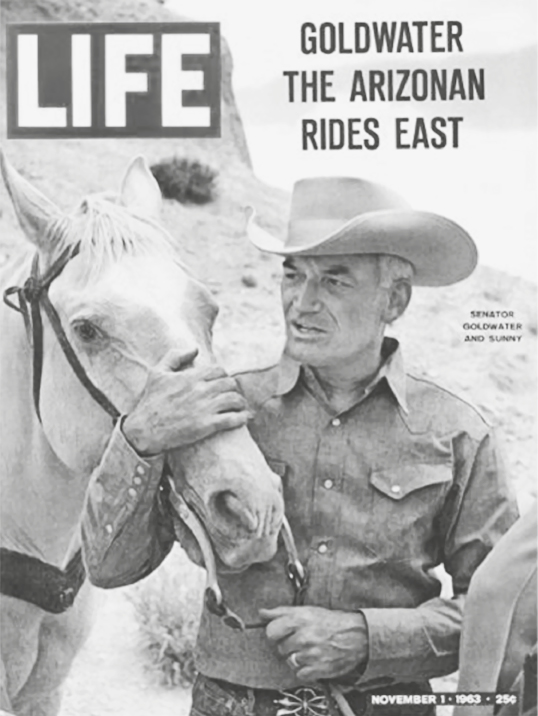
The moment in July 1964 when Arizona Senator Barry Goldwater took the stage at the Cow Palace outside San Francisco and beamed at the cheering Republicans who had just nominated him for president is iconicbut not for the reasons we remember. Goldwater delivered the line that became a rally cry for a rising generation of conservatives in the Republican Party, saying that Extremism in the defense of liberty is no vice. And... moderation in the pursuit of justice is no virtue. But the moment did much more than galvanize activists. It marked the resurrection of an old political movement by a modern political party. In Goldwaters time, people claiming to be embattled holdouts defending American liberty called themselves Movement Conservatives. A century before, their predecessors had called themselves Confederates.

